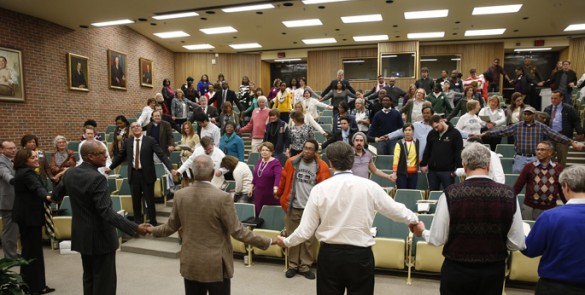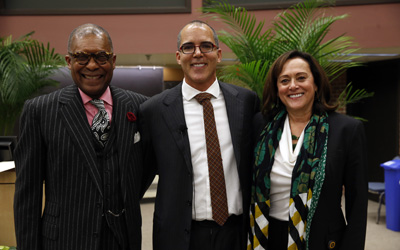
Vanderbilt University Medical Center staff, faculty, students and guests packed 208 Light Hall Monday to honor the life and legacy of the late Civil Rights activist Martin Luther King Jr.
The 14th annual lecture, sponsored by the Schools of Medicine and Nursing, featured James Forman Jr., a clinical professor of Law and supervising attorney at Yale Law School.
“It’s an honor to be in Nashville, specifically because the Nashville student movement in the 60s was one of the most important moments in the history of the Civil Rights struggle,” said Forman.

“These students saw a blatant injustice. They fought back. They picketed. They marched. They sat and refused to move until they were served (at lunch counters in downtown Nashville).
“They risked their lives. They risked physical assault. They risked insult and they won.”
Although Forman told the crowded room that the legacy was theirs to claim, he warned that the struggle was not over yet.
Using references from King’s 1967 speech called “The Other America,” where he spoke of two Americas — one beautiful and overflowing “with the milk of prosperity and the honey of opportunity” and the other a place where millions were left disenfranchised — Forman told the audience that he had been thinking of the “other America” more frequently over the last few months as the nation has focused on the recent controversial deaths of black males in incidents involving police officers.
When his students asked why these events continue to happen and why black lives seem not to be protected by the legal system, Forman told them to look at the larger picture.
“We need to stop and contemplate the cumulative impact of centuries of discrimination. In order to understand racism and equality then and now, we have to go to America’s foundation and that includes slavery.
“Slavery is the trauma from which we have yet to recover because it’s a trauma we have yet to confront,” Forman said.
He reminded the audience that King’s message challenged people to look deeper at injustices everywhere and that change “looks impossible until it happens.”
“We cannot ignore those who are still knocking,” Forman said. “Somebody is knocking, seeking equal access to health care. Somebody is knocking on our nation’s borders seeking refuge from persecution. Somebody is knocking on the doors of the Supreme Court seeking the equal right to marry who they love.
“Let’s commit ourselves individually and collectively in honor of Dr. King and all of those who fought with him to get up and answer the knock on the door.”
During the celebration, the Martin Luther King Jr. Award was presented to Sten Vermund, M.D., Ph.D., Amos Christie Professor of Global Health and director of the Vanderbilt Institute for Global Health, for his contributions to the cause of improving health worldwide, which exemplify the ideals of social justice espoused by King.
According to his nomination letter, Vermund’s “achievements are inextricably tied to his commitments to marginalized populations in the U.S. and the world. He is the quintessential public health scientist/activist seeking to understand and listen to underserved populations and meet the gaping needs of the disenfranchised.”












